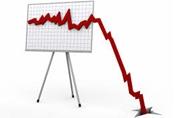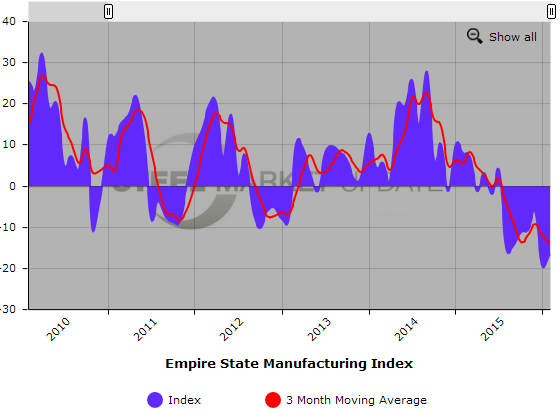Market Data

February 15, 2016
Empire State Manufacturing Still in Decline
Written by Sandy Williams
Business activity continued to decline for New York manufacturers in the latest Empire State Manufacturing Survey. The general business conditions index picked up 3 points registering -16.6, its seventh consecutive month in contraction. The index was weaker than economist estimates of 10.0 to 10.50.
Most indexes in the survey remained in contraction in February but showed some improvement. The new orders index rose 12 points to -11.6, slowing its downward pace compared to January. Shipments gained 3 points for a reading of -11.6 and delivery times rose 11 points to -2.0.
Inventories leveled off in February registering a flat zero. Input prices increased slightly as reflected by a drop of 13 points to 3 on the prices paid index. Selling prices declined from +4.0 in January to -4.95 in February.
Employee numbers remained unchanged while the average workweek shortened.
The six month outlook for general business conditions was still weak after falling sharply from December to January, but improved slightly in February, up five points on the index to 14.5. Readings for future new orders both rose into the low 20s. Future employment levels are expected to increase.
“So far during the course of the recovery, the soft patches have tended not to last too long, however this one has been significantly deeper and longer lasting,” noted analyst Ward McCarthy of Jeffries. “The index has been below zero for 7 straight months, which hasn’t happened since December 2008 through June 2009. The continued weakness in commodity prices is likely going to continue to weigh on business conditions, but we expect that things will improve if prices rebound.”
The Empire State Manufacturing Index is conducted monthly by the Federal Reserve Bank of New York.
Below is a graph showing the history of the Empire State Manufacturing Index. You will need to view the graph on our website to use it’s interactive features, you can do so by clicking here. If you need assistance with either logging in or navigating the website, please contact our office at 800-432-3475 or info@SteelMarketUpdate.com.








